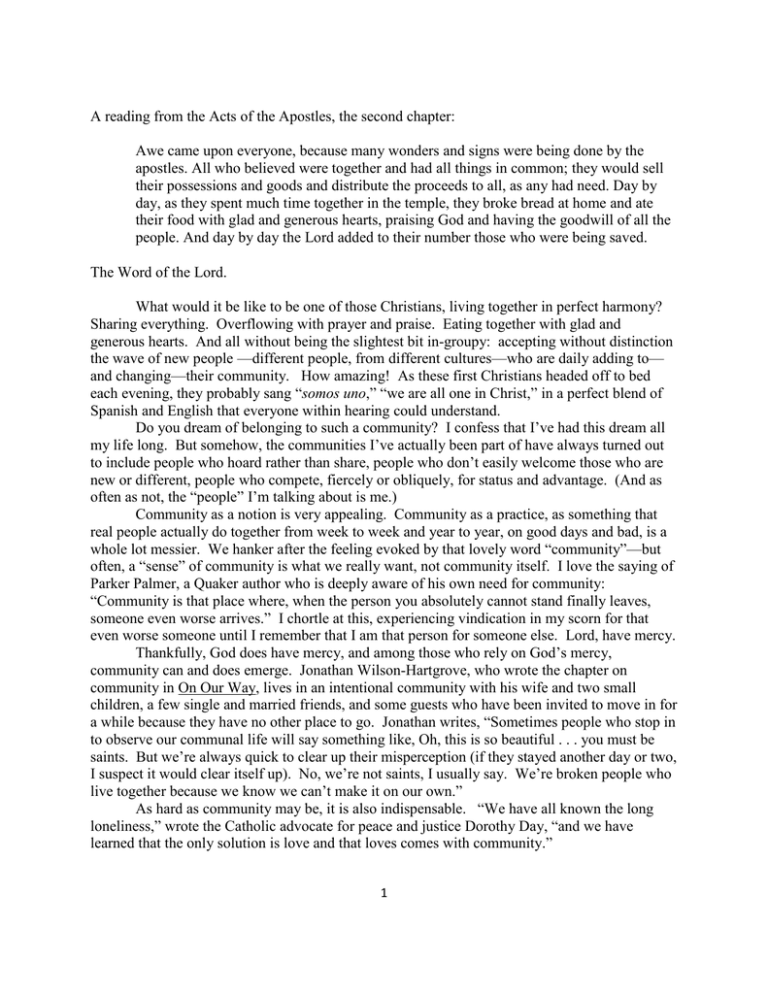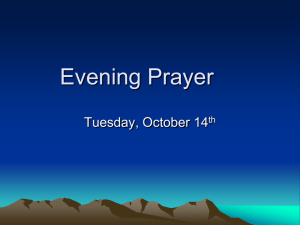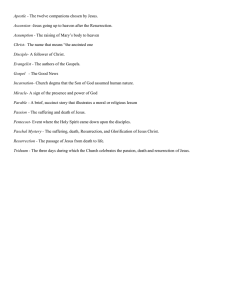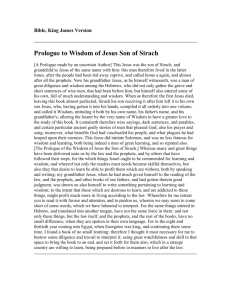A reading from the Acts of the Apostles, the second... Awe came upon everyone, because many wonders and signs were...
advertisement

A reading from the Acts of the Apostles, the second chapter: Awe came upon everyone, because many wonders and signs were being done by the apostles. All who believed were together and had all things in common; they would sell their possessions and goods and distribute the proceeds to all, as any had need. Day by day, as they spent much time together in the temple, they broke bread at home and ate their food with glad and generous hearts, praising God and having the goodwill of all the people. And day by day the Lord added to their number those who were being saved. The Word of the Lord. What would it be like to be one of those Christians, living together in perfect harmony? Sharing everything. Overflowing with prayer and praise. Eating together with glad and generous hearts. And all without being the slightest bit in-groupy: accepting without distinction the wave of new people —different people, from different cultures—who are daily adding to— and changing—their community. How amazing! As these first Christians headed off to bed each evening, they probably sang “somos uno,” “we are all one in Christ,” in a perfect blend of Spanish and English that everyone within hearing could understand. Do you dream of belonging to such a community? I confess that I’ve had this dream all my life long. But somehow, the communities I’ve actually been part of have always turned out to include people who hoard rather than share, people who don’t easily welcome those who are new or different, people who compete, fiercely or obliquely, for status and advantage. (And as often as not, the “people” I’m talking about is me.) Community as a notion is very appealing. Community as a practice, as something that real people actually do together from week to week and year to year, on good days and bad, is a whole lot messier. We hanker after the feeling evoked by that lovely word “community”—but often, a “sense” of community is what we really want, not community itself. I love the saying of Parker Palmer, a Quaker author who is deeply aware of his own need for community: “Community is that place where, when the person you absolutely cannot stand finally leaves, someone even worse arrives.” I chortle at this, experiencing vindication in my scorn for that even worse someone until I remember that I am that person for someone else. Lord, have mercy. Thankfully, God does have mercy, and among those who rely on God’s mercy, community can and does emerge. Jonathan Wilson-Hartgrove, who wrote the chapter on community in On Our Way, lives in an intentional community with his wife and two small children, a few single and married friends, and some guests who have been invited to move in for a while because they have no other place to go. Jonathan writes, “Sometimes people who stop in to observe our communal life will say something like, Oh, this is so beautiful . . . you must be saints. But we’re always quick to clear up their misperception (if they stayed another day or two, I suspect it would clear itself up). No, we’re not saints, I usually say. We’re broken people who live together because we know we can’t make it on our own.” As hard as community may be, it is also indispensable. “We have all known the long loneliness,” wrote the Catholic advocate for peace and justice Dorothy Day, “and we have learned that the only solution is love and that loves comes with community.” 1 We have learned, she says. We have? Which “we” is that? Day surely means her own Catholic Worker community, but I think she is also suggesting that the church as a whole possesses some hard-won wisdom about life together that is larger and longer than any one community can possess. We have access to some of this wisdom in written form, especially in Scripture. But this wisdom also comes to us through practices, through patterns of shared life performed with the bodies and voices and material goods of the faithful across the centuries. Practices like breaking bread together, sharing possessions, praying, praising God, and welcoming strangers. Practices that provide regular, everyday opportunities for actual people in actual places to learn to love one another as they respond, side by side, to God’s presence and promise for them and for all the world. In their effort to live as community, Jonathan and his housemates have done all they can to seek out this wisdom. (His chapter is really an effort to share what they’ve discovered with you, for the sake of your own living; and this is what other chapters do too, for other practices.) They study Scripture. They ask for guidance from Benedictine monks, who have been at this community thing for a very long time. They join the struggle for racial reconciliation in their own communities. They ask what specific things Christian people have done together, week to week and century to century, to encourage faithful living in community. And then they try it out, as if they were rehearsing for life in God’s realm. And they pray, a lot. Good intentions, dreams of togetherness, and hard work will not be enough, they learn from their wise forebears. The community they have with one another will collapse on its own; it has life and strength only as these are granted by God and united to the life-giving death of Jesus. Their community will also collapse if it closes in upon itself, that is, if they fail to see Jesus in those they don’t yet know, especially in strangers and those in need. I suspect that many fledgling communities that operate something like this are represented here today—though you may not recognize yourselves as such. Communities like SALT, whose members encourage one another in prayer and service and advocacy and also invite the rest of us to practice generous giving and to embrace those in need as brothers and sisters. Communities like our wonderful choirs, whose members show up regularly to practice— to rehearse the harmony the human family so deeply desires— who then serve God and the rest of us worshipers with song—including, sometimes, new songs in unfamiliar languages that press us toward a wider vision of the church. Communities like Fellowship House, or Bible study groups, or the networks that sometimes emerge to support someone through a time of illness or loss. And also communities where God’s spirit is working to heal the long loneliness of the broken human family even though these communities may not explicitly bear the name of Christ: Alliance, Engineers without Borders, the Gandhi-King Center, and the barely visible groups of friends that practice both support for one another and openness to neighbors beyond their little circle. Those of us who gather in this chapel to ponder and receive the way of abundant life that has been given to the world through Jesus’ reconciling life, death, and resurrection are also a community. On the surface, we’re quite different from the one in Acts, especially in our imperfection. But if we look closely, I think we can see a family resemblance, born in our common baptism, sustained by the same Spirit that enlived them at Pentecost, and embodied in practices of table, prayer, and welcome. Trying really, really hard to be like that little community in first-century Jerusalem won’t make us like them. But praying to God, in the company of one another may open us to be the community God desires us to be here, now, for 2 our own good and for the good of this campus and this world. “Forgive us our sins, as we forgive those who sin against us,” we will say to God while sitting or kneeling close together with one another. “Your kingdom come,” we will pray, asking together for what we could not even imagine alone. On Our Way is an invitation to notice the character and the blessings of the way of abundant life we were given when we were baptized into the death and resurrection of Jesus and knit into the body of Christ. The authors offer readers this invitation to encourage them to embrace this way of life with greater trust and boldness. And On Our Way is an effort to share the practical wisdom of our forebears and contemporaries about this way of life—in this chapter, the wisdom of Benedict and Dorothy Day and Jonathan Wilson-Hartgrove—to help readers be wise and resourceful in living this way of life in our own situations. The book ends with a paraphrase of something Martin Luther said about the Christian life. I’ll end here too: A whole life is made not of godliness but of the process of becoming godly. A whole life is known not by health but by getting well, not by being but by becoming, not by rest but by exercise. We are not now what we shall be, but we are on our way. The process is not yet finished, but it is actively going on. We have not reached the goal, but we are on the right road. At present, everything does not gleam and sparkle. But everything is being made new. Dorothy C. Bass November 9, 2010 The Chapel of the Resurrection Valparaiso University 3




